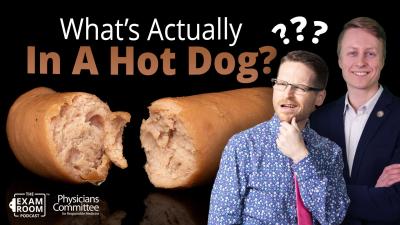Bacon Doesn’t Love You Back: Doctor-Led Protest at Bacon Fest on April 27
New Oxford Study Says Eating Just One Slice of Bacon Increases Risk of Colorectal Cancer by 20 Percent
DEWEY BEACH, Del.—The Physicians Committee for Responsible Medicine—a nonprofit with 12,000 doctor members— protested with signs reading “Love Bacon? Bacon Doesn’t Love You Back” at the Dewey Beach Bacon Festival in Dewey Beach, Del., on Saturday, April 27, from 1:30 p.m. to 2:30 p.m. The protest was led by Kerry Foley, M.D., of Dewey Beach and Washington, D.C., to raise awareness of the negative health consequences of eating bacon.
“Your colon does not love the Dewey Beach Bacon Fest,” says Dr. Kerry Foley. “The bacon festival should be offering customers a free colorectal cancer screening with every purchase of cancer-causing bacon.”
A new University of Oxford study has concluded that even one slice of bacon a day can increase the risk of colorectal cancer by whopping 20 percent. Bacon increases the risk of colorectal cancer and has been classified as “carcinogenic to humans” by the World Health Organization. After reviewing more than 800 studies, WHO concluded that each 50-gram portion of processed meat (a few slices of bacon or a hot dog) eaten daily increases the risk of colorectal cancer by 18 percent. The new Oxford study found that the risk is even higher than the WHO previously concluded. The World Cancer Research Fund and the American Institute for Cancer Research have also found that “the evidence on processed meat and cancer is clear-cut.” Both the American Medical Association and the American College of Cardiology have recommended that hospitals remove processed meat from menus.
Colorectal cancer isn’t the only cancer risk that comes from consuming processed meat. Eating 50 grams of processed meat daily also increases the risk of prostate cancer, pancreatic cancer, and overall cancer mortality. And a study of more than 200,000 women found that eating about 20 grams of processed meat each day—less than half the size of a regular hot dog—increased breast cancer risk by 21 percent.
To speak with Dr. Foley or another expert, please contact Kenzie Phillips at 202-527-7342 or kphillips [at] pcrm.org (kphillips[at]pcrm[dot]org).
Media Contact
Kenzie Phillips
202-527-7342
kphillips[at]pcrm.org
Founded in 1985, the Physicians Committee for Responsible Medicine is a nonprofit organization that promotes preventive medicine, conducts clinical research, and encourages higher standards for ethics and effectiveness in education and research.









